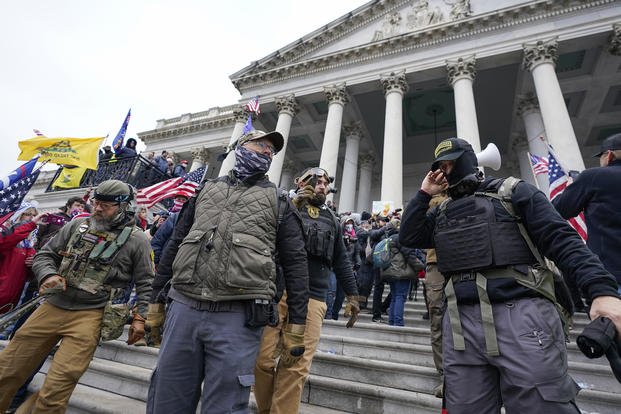The chief Senate oversight committee released a report last week that urges federal law enforcement agencies to "do more" to combat domestic terrorism, saying that the agencies need to do a better job collecting data on the issue.
While the report focused broadly on rising instances of domestic extremism, the introduction, citing law enforcement, included nine "recent terrorism attacks" as evidence of the threat. Four of those -- including the Jan. 6 attack on the U.S. Capitol -- involved individuals with military connections.
Titled "The Rising Threat of Domestic Terrorism," the Homeland Security and Governmental Affairs Committee's 129-page report asked the Departments of Justice and Homeland Security to reexamine how they tackle domestic extremism.
Read Next: VA Unveils New Scholarships for Future Mental Health Workers as Agency Works to Combat Shortages
"Reports of extremism among servicemembers and veterans is extremely concerning," a committee aide told Military.com over email, speaking on background and emphasizing that the report was a broad condemnation of the way federal agencies handle extremism data, "but it's an issue that will require additional detailed analysis that goes beyond the scope of this report."
The report comes as a number of institutions and oversight agencies -- in this instance, Congress' foremost authority on homeland security -- continue to pressure law enforcement to address domestic extremism.
"This investigation determined that DHS and FBI are not adequately tracking data on acts of domestic terrorism, and that they must do more to follow the law and effectively track these plots and crimes, regardless of who is committing them or which federal, state or local agency is collecting the data," the aide added.
The committee pointed to federal law enforcement's historical reticence to address domestic extremism, citing the misuse of post-9/11 surveillance powers, which resulted in threats to civil liberties, and "a disproportionate focus on international terrorist threats over domestic terrorist threats" as a conduit for data collection reform and oversight.
For example, the FBI held off naming domestic terrorism as a top threat until 2018. DHS, despite internally acknowledging the threat for a decade, had not "publicly acknowledged white supremacist violence as a major threat to national security" until 2019, according to the report.
In its findings, the committee addressed the use of social media as a rallying tool for extremists, citing the Proud Boys, Oath Keepers, Boogaloo Bois, and Three Percenters as groups who use social media to espouse extremist views; all four groups are either known to recruit veterans and service members, have a significant veteran following, or both.
The committee concurred with several government watchdog reports citing unclear assessment standards, lack of data and ambiguous definitions for phrases like "targeted violence" or even "domestic violent extremism" as ripe for disparate and imprecise handling of different terrorist groups.
Four of the nine cases cited in the introduction of the committee's report involved Americans with military connections:
- James Alex Fields Jr., an Ohio man serving a life sentence for ramming his vehicle into a crowd in Charlottesville, Virginia, during the "Unite the Right Rally" washed out of Army basic training after four months.
- The Jan. 6, 2021, attack on the Capitol involved 118 individuals with military connections, according to the George Washington Program on Extremism -- nearly 15% of those charged for their actions that day.
- Joseph Morrison, a former Marine, was found guilty of providing material support to a terrorist group for his involvement in the plot to kidnap Michigan Gov. Gretchen Whitmer.
- Curtis Allen, a former Kentucky National Guardsman, was convicted of conspiracy to use a weapon of mass destruction for his involvement in the attempted plot to attack "an apartment complex and mosque used by Somali immigrants in Kansas," according to the report.
The report also cited mid-2000s FBI and DHS reports that address extremist groups' propensity to recruit (or "self-recruit") veterans.
In the appendix, the committee pointed to the FBI and DHS's joint 2015 statement titled "Twenty Years After Oklahoma City Bombing, Domestic Extremism Remains a Persistent Threat." The Oklahoma City bombing was a 1995 attack on a federal building by Timothy McVeigh, a decorated Gulf War veteran. McVeigh killed 168 people, including children, and the event is considered the deadliest act of domestic terrorism in U.S. history.
The aide who spoke to Military.com emphasized that the committee did not specifically look at any one group, including veterans and service members.
"This report focused on examining the overall threat posed by domestic terrorism, including white supremacist and anti-government violence, and how domestic federal law enforcement and security agencies are addressing these threats, as well as how these dangerous ideologies proliferate across widely used social media platforms," the committee aide told Military.com over email. "The report did not examine in detail the individuals and groups who are perpetrating these attacks."
-- Drew F. Lawrence can be reached at drew.lawrence@military.com. Follow him on Twitter @df_lawrence.











